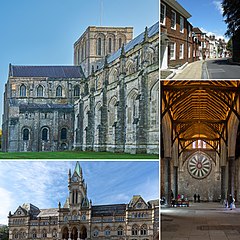
Back Winchester Afrikaans Wintanceaster ANG ونشستر Arabic ونشستر ARZ Winchester AST Uinçester (İngiltərə) Azerbaijani Уінчэстэр Byelorussian Ўінчэстэр BE-X-OLD Уинчестър Bulgarian উইনচেস্টার Bengali/Bangla
| Winchester | |
|---|---|
| City | |
 Clockwise from top left: Winchester Cathedral, Great Minster Street, Great Hall of Winchester Castle and Winchester Guildhall | |
 Coat of arms of Winchester | |
Location within Hampshire | |
| Population | 48,478 [1] |
| OS grid reference | SU485295 |
| • London | 60 miles (97 km) |
| District | |
| Shire county | |
| Region | |
| Country | England |
| Sovereign state | United Kingdom |
| Post town | WINCHESTER |
| Postcode district | SO22, SO23 |
| Dialling code | 01962 |
| Police | Hampshire and Isle of Wight |
| Fire | Hampshire and Isle of Wight |
| Ambulance | South Central |
| UK Parliament | |
Winchester (/ˈwɪntʃɪstər/, /-tʃɛs-/)[2][3][4] is a cathedral city in Hampshire, England. The city lies at the heart of the wider City of Winchester, a local government district, at the western end of the South Downs National Park, on the River Itchen. It is 60 miles (97 km) south-west of London and 14 miles (23 km) from Southampton, its nearest city. At the 2021 census, the built-up area of Winchester had a population of 48,478. The wider City of Winchester district includes towns such as Alresford and Bishop's Waltham and had a population of 127,439 in 2021.[5] Winchester is the county town of Hampshire and contains the head offices of Hampshire County Council.
Winchester developed from the Roman town of Venta Belgarum, which in turn developed from an Iron Age oppidum. Winchester was one of the most important cities in England until the Norman conquest in the eleventh century. It has since become one of the most expensive and affluent areas in the United Kingdom.
The city's major landmark is Winchester Cathedral. The city is also home to the University of Winchester and Winchester College,[6] the oldest public school in the United Kingdom still using its original buildings.
- ^ ONS census 2021
- ^ Wells, John C. (2000). "Winchester". Longman Pronunciation Dictionary (2nd ed.). Longman. ISBN 0-582-36467-1.
- ^ "Definition of 'Winchester'". Collins English Dictionary.
- ^ "Winchester". Merriam-Webster.com Dictionary.
- ^ "How the population changed in Winchester, Census 2021 - ONS". www.ons.gov.uk. Retrieved 27 December 2023.
- ^ Adams, Henry Cadwallader (1878). Wykehamica: A History of Winchester College and Commoners, from the Foundation to the Present Day. J. Parker and Company.
